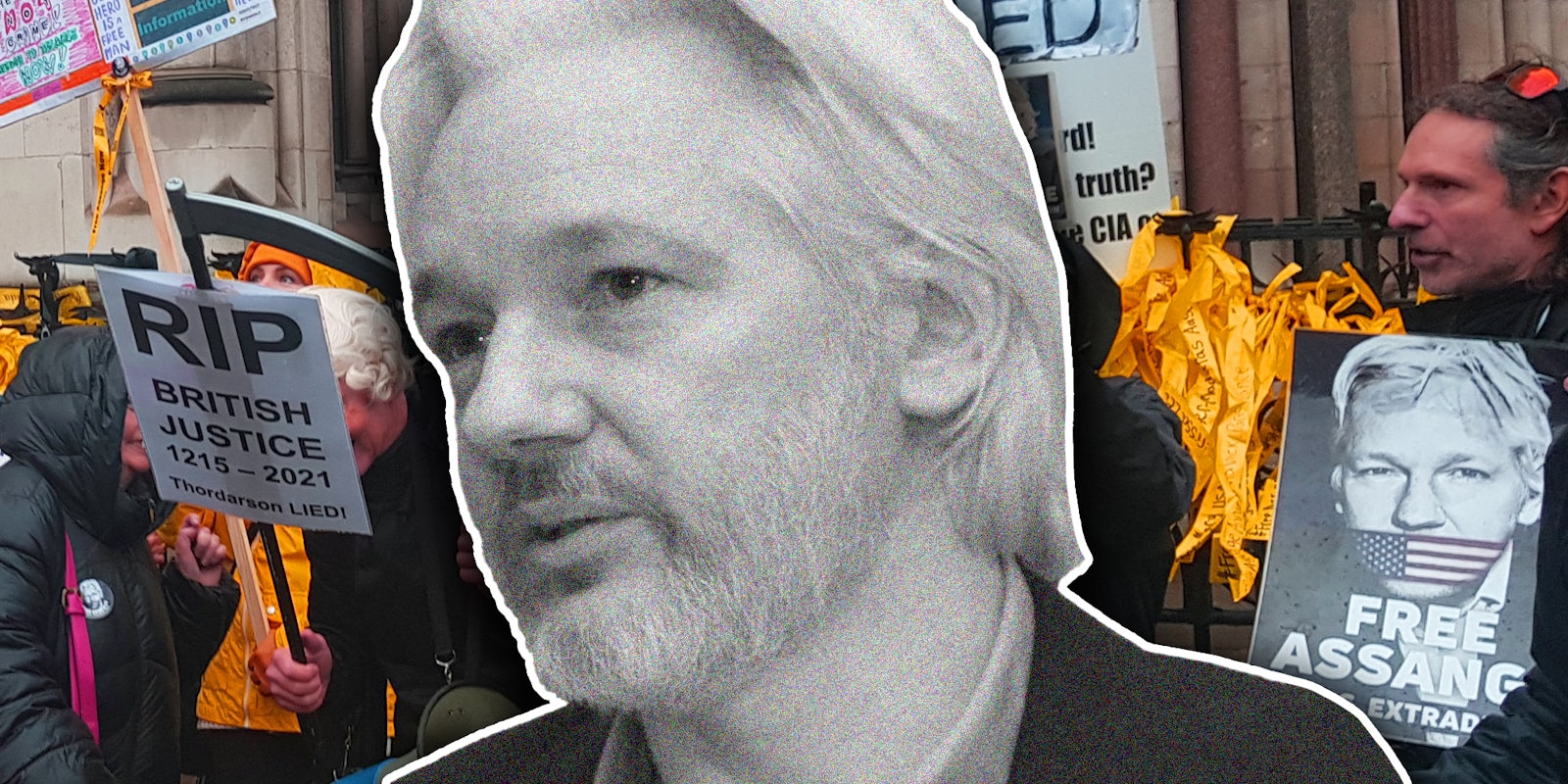Inside London’s Royal Courts of Justice, an orderly queue of observers came to watch Julian Assange’s last-ditch effort to stave off extradition to the U.S.
Outside, however, a raucous group of protesters shouted for Assange’s release with banners, trumpets, drums, and a costumed group acting out “the death of British justice.”
Kieran O’Donoghue, holding a massive “Free Assange” sign, told the Daily Dot, “If he’s extradited to the United States and locked up in a Supermax prison for the rest of his life, that’s going to have huge effects on journalists all over the planet.”
Assange’s last chance to fight extradition to the U.S. drew to a close today, with lawyers for the U.S. arguing that his activities went “far beyond” journalism, and that journalists “have no immunity to break the law.”
Assange, who founded WikiLeaks, has long been a thorn in the side of the U.S. government, publishing revealing secrets about the military and State Department.
Today’s hearing at the High Court was not a trial, but an application for Assange’s team to appeal against a 2022 extradition order signed by former Home Secretary Priti Patel. If Assange’s attorneys are successful, he will stay in Belmarsh prison while the U.K. Court of Appeals hears his case—if not, he could be on a plane to the U.S. in weeks. The justices will review the evidence and likely issue a decision in early March.
Yesterday, the defense presented its case, arguing that his charges under the Espionage Act amounted to political prosecution, and therefore he should be exempt under the U.S.-U.K. extradition treaty. Their arguments included the allegation that the CIA had discussed plans to kidnap or assassinate Assange while was under diplomatic protection in the Ecuadorian Embassy in London.
Today, barrister Clair Dobbin KC, representing the U.S., argued that Assange conspired with former U.S. soldier Chelsea Manning to hack and publish classified documents that contained unredacted names of vulnerable intelligence sources.
Some of these sources were journalists and human rights activists, Dobbin said, who had to flee their homes or faced violence when their names were exposed.
Manning served seven years in an Army prison for her role in helping obtain the cables. Assange has been accused of abetting her efforts and helping her attempt to crack a password.
Referring to the tranche of 250,000 documents released as part of 2010’s Cablegate, Dobbin said, “the material he published attracts no public interest whatsoever.” While many of the files were mundane, a number were explosive.
Judge Jeremy Johnson, one of two judges presiding at the hearing, clarified that by the time WikiLeaks had published the unredacted cables, the information had already been available elsewhere online.
In 2010, WikiLeaks partnered with news outlets to release redacted cables, until one of its media partners accidentally published the secure password to the server where the documents were stored.
WikiLeaks afterward released the rest of the unredacted documents. But, Dobbin said that Assange’s alleged collaboration with Manning on the hack was the issue at hand.
“This could be charged as conspiracy and aiding and abetting and under section 5 of the Official Secrets Act,” Dobbin said.
Judge Johnson pressed, “If in this country, a journalist had information of very serious wrongdoing by an intelligence agency and incited an employee to provide that information, and it was provided and published carefully, would a prosecution be compatible with Article Ten?”
Article Ten in the U.K.’s Human Rights Act is akin to the First Amendment, guaranteeing freedom of speech.
Dobbin said there wasn’t a “straightforward answer” to the question.
“Free speech is highly prized in America, which is why the U.S. has gone a long way to distinguish the appellant’s prosecution from other media,” she said.
In the afternoon, the lead defense barrister for Assange’s team, Mark Summers KC, replied, “It is a feat for the U.S. counsel to be on her feet for two-and-a-half hours advocating for the prosecution for disclosure of this material without once referring to the fact that the material disclosed war crimes.”
Most famously, the cables WikiLeaks received included footage of a U.S. helicopter crew discussing an air strike against Iraqi civilians and video of U.S. troops killing journalists.
During the defense hearing yesterday, it was alleged that Assange could face the death penalty if tried in the U.S. Dobbin pointed out that Assange is not charged with treason, which carries a possible death penalty, and that Manning was convicted of treason and given a 35-year sentence.
Judge Johnson asked if the prosecution could be sure that he wouldn’t be charged with treason when he got there, and therefore potentially receive the death penalty. Dobbin affirmed that it was possible, but said, “Why should the prosecutors give an assurance when there is no real prospect it would happen?”
Eighteen charges against Assange were unsealed in 2019, 17 for violating the Espionage Act. He had long stayed out of the reach of prosecution while seeking asylum in the Ecuadorian Embassy in London while fighting rape charges in Sweden. In April 2019, British police hauled him out of the embassy after an extradition request by the U.S., which he’s since been fighting.
Outside the court, the Daily Dot asked O’Donoghue whether the prosecution’s allegations of hacking—and causing potential harm to these sources affected his view of Assange.
“Not in the slightest,” he said. “Many journalists have published classified documents. If something is a war crime, it doesn’t matter if the truth is classified or not, the public have a right to know.”
“The invasion of Iraq was an illegal war. People get killed in wars. That is not Julian Assange’s fault. That is not WikiLeaks’ fault. That is the decision of the United States government.”



